
by Dee Harlow (Laos) | Feb 28, 2013 | Culture, Discipline, Family, Kids, Living Abroad, Motherhood, Multicultural, Parenting, World Moms Blog, World Motherhood
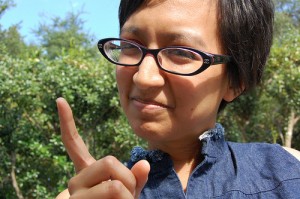 What are the rules for parenting other children or giving parenting advice or just plain parenting interference? And what is the appropriate response?
What are the rules for parenting other children or giving parenting advice or just plain parenting interference? And what is the appropriate response?
I imagine it differs by country and culture, by personality and preference. I’ve been scolded in both Mexico — and now, in Laos — about not dressing my children “warmly” enough during the “cool” season: (Here, what is considered “cold” to the locals is perfect and refreshing for us to enjoy, say, in jeans and a t-shirt without wrapping ourselves in sweaters and down jackets like everyone else around us.) With an understanding nod and smile, I always reply with a cheerful yet emphatic, “To us, this isn’t cold. It’s perfect!”
For all the concern in other countries about my children being cold, there is a surprising lack of concern for their over-consumption of sweets. One time while waiting to board our plane, a troupe of Korean men and women each gave my kids a piece of candy, repeatedly. After one or two, I asked my kids to politely say, “Thank you.” After the fourth, fifth, sixth piece, I made them do the same while I motion a polite, “Thank you, but please, no more.” Then, when they cojoled my kids to take even more, I resorted to a stern-faced, “NO thank you,” and prohibited my kids from escaping my firm grasp. Enough is enough no matter how kind the gesture.
(Another candy incident that elicited an immediate “No” from me without even a “Thank you” was returning to our hotel in Vietnam late at night with two obviously over-tired kids and having the doorman hand them a bowl (yes, a bowl!) full of candy to grab!)
(more…)
One of Dee’s earliest memories was flying on a trans-Pacific flight from her birthplace in Bangkok, Thailand, to the United States when she was six years old. Ever since then, it has always felt natural for her to criss-cross the globe. So after growing up in the northeast of the US, her life, her work and her curiosity have taken her to over 32 countries. And it was in the 30th country while serving in the Peace Corps in Uzbekistan that she met her husband. Together they embarked on a career in international humanitarian aid working in refugee camps in Darfur, Sudan, and the tsunami torn coast of Aceh, Indonesia.
Dee is now a full-time mother of three-year old twins and continues to criss-cross the globe every two years with her husband who is in the US Foreign Service. They currently live in Vientiane, Laos, and are loving it! You can read about their adventures at Wanderlustress.
More Posts

by Mama Mzungu (Kenya) | Feb 7, 2013 | Casting a Wider Net, Culture, Kenya, Uncategorized, World Motherhood
Our “Casting a Wider Net” series features mothers around the world who’s voices have typically been excluded from the blogosphere, due to lack of access to computers or the internet, low literacy or poverty. This feature aims to include their important and distinct perspectives with interviews and occasional video clips.
——————–
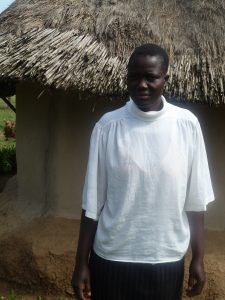 Meet Wilkister. She’s a mother of seven children, including a remarkable two sets of twins, ranging from 7 to 18 years old. She lives in Western Kenya and tends a shamba (farm) of maize, cassava, millet and vegetables. She met her husband, a primary school teacher, when she traveled to his village to visit her sister who had married a relative of his. The marriage was sealed with a pride price, she moved in to his homestead and has become an important member of his extended family. Her relatives describe her as responsible, strong and hardworking.
Meet Wilkister. She’s a mother of seven children, including a remarkable two sets of twins, ranging from 7 to 18 years old. She lives in Western Kenya and tends a shamba (farm) of maize, cassava, millet and vegetables. She met her husband, a primary school teacher, when she traveled to his village to visit her sister who had married a relative of his. The marriage was sealed with a pride price, she moved in to his homestead and has become an important member of his extended family. Her relatives describe her as responsible, strong and hardworking.
Unlike many other women in her village, she graduated secondary school. She speaks four languages fluently and worked as a translator for me on a recent trip to her village. The following are some of Wilkister’s thoughts on marriage, family and life… (more…)
Originally from Chicago, Kim has dabbled in world travel through her 20s and is finally realizing her dream of living and working in Western Kenya with her husband and two small boys, Caleb and Emmet. She writes about tension of looking at what the family left in the US and feeling like they live a relatively simple life, and then looking at their neighbors and feeling embarrassed by their riches. She writes about clumsily navigating the inevitable cultural differences and learning every day that we share more than we don’t. Come visit her at Mama Mzungu.
More Posts - Website
Follow Me:

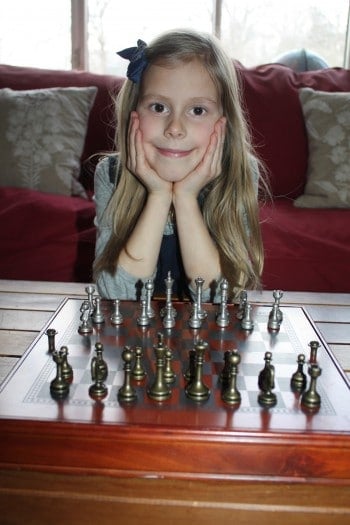
by Courtney Cappallo (USA) | Jan 31, 2013 | Childhood, Culture, Education, Family, Homeschooling, Motherhood, World Motherhood, Younger Children
 A daughter takes the imprint of what it means to be a woman from her mother. William Ross Wallace’s poem “What Rules the World” has the famous line,
A daughter takes the imprint of what it means to be a woman from her mother. William Ross Wallace’s poem “What Rules the World” has the famous line,
“The hand that rocks the cradle is the hand that rules the world,” which extols motherhood as a paramount force in molding the character of a child.
A child will travel through a series of developmental stages. Many world traditions acknowledge the seven-year cycle in human development. In the Jesuit tradition a child is said to have reached the age of reason by age seven.
The first cycle is from birth to seven years of age. The beginning stage sets the foundation for the remainder of your child’s life. The early years influence the health and well-being of a child and will have an impact on them throughout their lifetime. (more…)
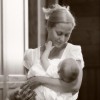
Courtney Cappallo is a mom of two girls, ages 7 and 4-years-old. She is living her dream life by residing on Cape Cod and being able to stay at home with her two little beauties. Courtney is currently homeschooling both of her daughters for 2nd grade and preschool, respectively.
Courtney uses a mix of Classical Education and Montessori. She is a strong believer in teaching to the five senses. Courtney’s homeschooling efforts are unique, as she uses the latest technology of the Smartboard. She is also taking on the task of learning Spanish as a second language, as well as, teaching her two children and husband Spanish.
Prior to becoming a homeschooling teacher, Courtney was the Director of Marketing for Simon Property Group, which is the largest U.S. real estate company. Courtney was Simon’s Director of Marketing for the Burlington Mall, Arsenal Mall and Cape Cod Mall. Courtney is a graduate of Villanova University and is proud of her small town roots from growing up in Oxford, Pennsylvania, which only has two traffic lights! She can be found making homeschooling lessons and more at Table of Four !
More Posts

by Lady Jennie (France) | Jan 30, 2013 | Childhood, Culture, Education, France
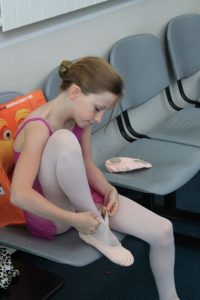 I’ve always been determined that my children will have every cultural advantage I had as a child, which means that they will know how to swim competitively, to read music, to play at least one instrument, and have an additional sport of their choice. It seemed a matter of course that they would also go to the Symphony (ballet, opera and theatre) and have cultivated a great love of reading from an early age.
I’ve always been determined that my children will have every cultural advantage I had as a child, which means that they will know how to swim competitively, to read music, to play at least one instrument, and have an additional sport of their choice. It seemed a matter of course that they would also go to the Symphony (ballet, opera and theatre) and have cultivated a great love of reading from an early age.
But I’m starting to realize that I’m setting an unfair expectation. First of all, they do benefit from many of these things. My 8-year old daughter takes classical ballet twice a week, and has solfège (music theory) along with her piano lessons. My 7-year old son has soccer once a week, introduction to solfège and instrument discovery, which will help him choose what he will want to play in the future. My youngest son, who is only four, is taking multi-sports – his own particular activity that he takes very seriously as a participating member of the under-ten set in the family.
But Symphony and theatre? It’s too far, too expensive, too inconvenient. Swimming lessons? We can’t fit them into our already packed schedule. And reading? I’m not inspired to go to the library each week like I did as a child, because it means that they will be reading even more French, and they already get plenty of that in school. What about that love of literature they were supposed to have cultivated in English – in my native tongue? For heaven’s sake, they don’t even know they’re half-American, and keep asking when we’re going to go visit their grandparents in England again! (more…)
Jennie has lived in Taiwan, New York City and East Africa, and currently lives just outside of Paris with her French husband. She speaks rudimentary Mandarin, passable French and has had a varied career in Human Resources, Asian financial sales and humanitarian work. She is currently a mother to three young children, with writing and teaching gigs on the side, and blogs at A Lady in France.
More Posts
by Elizabeth Atalay | Jan 22, 2013 | Childhood, Cultural Differences, Health, India, Motherhood, Shot@Life, Vaccines, World Events, World Moms Blog, World Motherhood, Younger Children
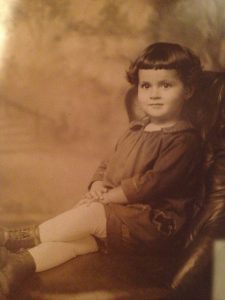
The Author’s Mother
She had one leg shorter than the other. Not in such a glaringly obvious way that one would immediately notice, but you could tell if you studied her walk or she pointed it out to you, like she did to me when I was little.
I couldn’t fully understand the story as a child, but my mother had contracted Polio when she was around three years old, and almost died. I remember that part because she had two names. Mildred was the name she was given at birth, and Goldie was the name she was re-named after she had recovered, as is customary in the case of near death experiences in the Jewish religion.
By the time I was born, the Polio vaccine had been developed and was administered widely to children in the United States. Polio was nearly eradicated in this country by then, and so the story of my mother’s near death from Polio became to me a long-ago folk tale from her childhood.
Sadly, that has not been the case for the rest of the world. Sure the numbers have dropped 99% since 1988 when there were 350,000 known cases around the world, to the 218 reported cases in 2012. Still, the fact is, that as long as Polio remains in even one child, children the world over are at risk of contracting the disease. The victims of the highly infectious Poliomyelitis virus that attacks the nervous system are usually children younger than five years old.
(more…)

Elizabeth Atalay is a Digital Media Producer, Managing Editor at World Moms Network, and a Social Media Manager. She was a 2015 United Nations Foundation Social Good Fellow, and traveled to Ethiopia as an International Reporting Project New Media Fellow to report on newborn health in 2014. On her personal blog, Documama.org, she uses digital media as a new medium for her background as a documentarian. After having worked on Feature Films and Television series for FOX, NBC, MGM, Columbia Pictures, Warner Brothers, 20th Century Fox, and Castle Rock Pictures, she studied documentary filmmaking and anthropology earning a Masters degree in Media Studies from The New School in New York. Since becoming a Digital Media Producer she has worked on social media campaigns for non-profits such as Save The Children, WaterAid, ONE.org, UNICEF, United Nations Foundation, Edesia, World Pulse, American Heart Association, and The Gates Foundation. Her writing has also been featured on ONE.org, Johnson & Johnson’s BabyCenter.com, EnoughProject.org, GaviAlliance.org, and Worldmomsnetwork.com. Elizabeth has traveled to 70 countries around the world, most recently to Haiti with Artisan Business Network to visit artisans in partnership with Macy’s Heart of Haiti line, which provides sustainable income to Haitian artisans. Elizabeth lives in New England with her husband and four children.
More Posts

by Shaula Bellour (Indonesia) | Jan 17, 2013 | Childhood, Cultural Differences, Family, Indonesia, International, Kids, Living Abroad, Motherhood, Shaula Bellour, World Moms Blog, World Motherhood
 Every day, my 5-year old son asks if he can ride his bike. Rain or shine; straight off the school bus, and often way too early on weekend mornings. With the training wheels off and his helmet on, he’s ready to go.
Every day, my 5-year old son asks if he can ride his bike. Rain or shine; straight off the school bus, and often way too early on weekend mornings. With the training wheels off and his helmet on, he’s ready to go.
Lucky for us, this is possible. We may live in a chaotic city of 10 million, but our quiet street is a welcome oasis – a dead end lane with just 10 houses and 20 other children to play with. The older kids all attend different schools, but usually gather when they get home – riding bikes, swimming, playing at each other’s houses, exploring tropical backyards, and visiting the “farm” (a.k.a community garden) at the end of the road. It’s a pretty ideal set up for our family.
With its crumbling sidewalks, crazy traffic and lack of parks, Jakarta isn’t known for its public green spaces or outdoor culture. Although there are plenty of family-friendly activities here, a lot of kids spend much of their free time indoors – in cars, malls and air-conditioned play areas. I don’t know of any public playgrounds or parks near where we live, which makes us even more grateful to have safe outdoor spaces at home.
The many benefits of outdoor play are well-documented, contributing to physical and cognitive development, emotional and social well-being, creativity and imagination, a sense of community, and (more…)
Shaula Bellour grew up in Redmond, Washington. She now lives in Jakarta, Indonesia with her British husband and 9-year old boy/girl twins. She has degrees in International Relations and Gender and Development and works as a consultant for the UN and non-governmental organizations.
Shaula has lived and worked in the US, France, England, Kenya, Eritrea, Kosovo, Lebanon and Timor-Leste. She began writing for World Moms Network in 2010. She plans to eventually find her way back to the Pacific Northwest one day, but until then she’s enjoying living in the big wide world with her family.
More Posts

 What are the rules for parenting other children or giving parenting advice or just plain parenting interference? And what is the appropriate response?
What are the rules for parenting other children or giving parenting advice or just plain parenting interference? And what is the appropriate response?













